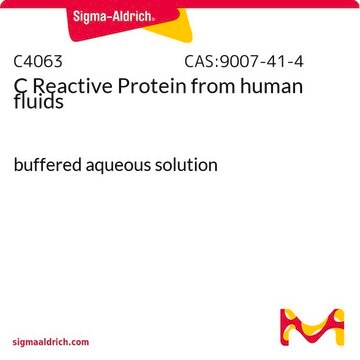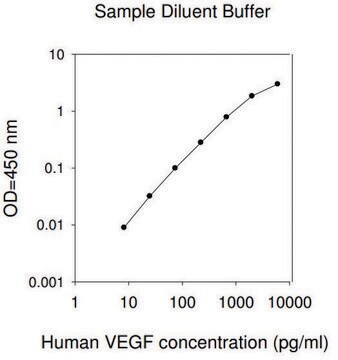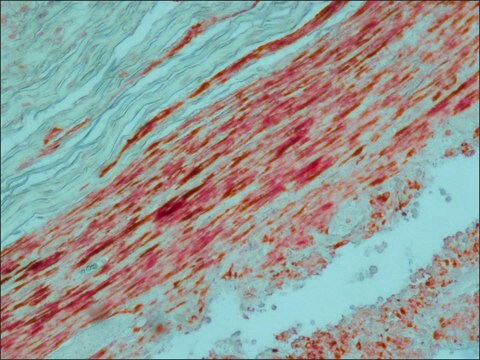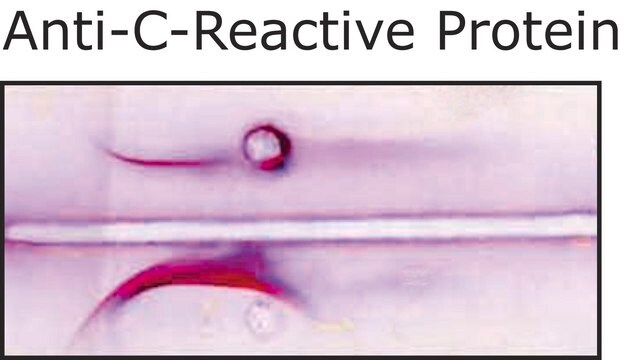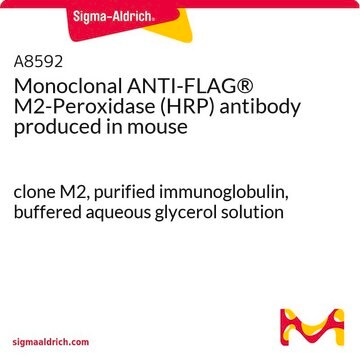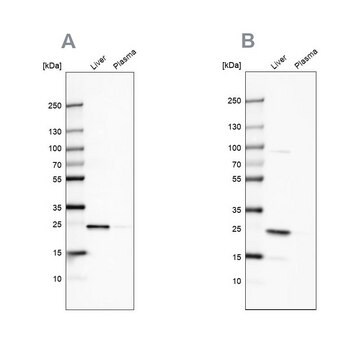추천 제품
생물학적 소스
human
Quality Level
재조합
expressed in E. coli
분석
≥95% (SDS-PAGE)
형태
lyophilized powder
효능
0.1000 μg/mL
분자량
apparent mol wt 8.7 kDa by SDS-PAGE (reducing)
포장
pkg of 25 μg
저장 조건
avoid repeated freeze/thaw cycles (Do not store in a frost-free freezer.)
기술
cell culture | mammalian: suitable
불순물
endotoxin, tested
UniProt 수납 번호
저장 온도
−20°C
유전자 정보
human ... CXCL13(10563)
생화학적/생리학적 작용
BCA-1 is a potent chemoattractant for B lymphocytes, but not T lymphocytes, monocytes, or neutrophils.
BCA-1 is a potent chemoattractant for B lymphocytes, but not T lymphocytes, monocytes, or neutrophils. Its specific receptor BLR1 is a G protein-coupled receptor originally isolated from Burkitt′s lymphoma cells. Among cells of the hematopoietic lineages, the expression of BRL1, now designated CXCR5, is restricted to B lymphocytes and a subpopulation of T helper memory cells.
The biological activity of human BLC/BCA-1 is measured by its ability to chemoattract mouse BaF/3 cells transfected with human CXCR5.
물리적 형태
Lyophilized from a 0.2 μm filtered solution in 35% acetonitrile and 0.1% TFA containing 50 μg bovine serum albumin per 1 μg of cytokine.
신호어
Warning
유해 및 위험 성명서
Hazard Classifications
Acute Tox. 4 Inhalation - Acute Tox. 4 Oral - Eye Irrit. 2
Storage Class Code
11 - Combustible Solids
WGK
WGK 3
Flash Point (°F)
Not applicable
Flash Point (°C)
Not applicable
시험 성적서(COA)
제품의 로트/배치 번호를 입력하여 시험 성적서(COA)을 검색하십시오. 로트 및 배치 번호는 제품 라벨에 있는 ‘로트’ 또는 ‘배치’라는 용어 뒤에서 찾을 수 있습니다.
Julia Miriam Weiss et al.
Oncotarget, 7(7), 7550-7562 (2016-01-16)
Abnormal overexpression of CXCL13 is observed in many inflamed tissues and in particular in autoimmune diseases. Myasthenia gravis (MG) is a neuromuscular disease mainly mediated by anti-acetylcholine receptor autoantibodies. Thymic hyperplasia characterized by ectopic germinal centers (GCs) is a common
D F Legler et al.
The Journal of experimental medicine, 187(4), 655-660 (1998-03-28)
Although most leukocytes, T lymphocytes in particular, respond to several different chemokines, there is virtually no information on chemokine activities and chemokine receptors in B lymphocytes. A putative chemokine receptor, BLR1, that is expressed in Burkitt's lymphoma cells and B
M D Gunn et al.
Nature, 391(6669), 799-803 (1998-03-05)
Secondary lymphoid organs (spleen, lymph nodes and Peyer's patches) are divided into compartments, such as B-cell zones (follicles) and T-cell zones, which provide specialized environments for specific steps of the immune response. Migration of lymphocyte subsets into these compartments is
R Förster et al.
Cell, 87(6), 1037-1047 (1996-12-13)
We describe the phenotype of gene-targeted mice lacking the putative chemokine receptor BLR1. In normal mice, this receptor is expressed on mature B cells and a subpopulation of T helper cells. Blr1 mutant mice lack inguinal lymph nodes and possess
Chunyan Li et al.
BioMed research international, 2015, 345413-345413 (2015-07-15)
To investigate the effect of CXCL13 (C-X-C motif chemokine 13) on hepatocellular carcinoma and clarify the potential mechanisms. 32 patients with hepatocellular carcinoma and 12 healthy controls were recruited for analyzing the expression of CXCL13 by RT-PCR (reverse transcription-polymerase chain
자사의 과학자팀은 생명 과학, 재료 과학, 화학 합성, 크로마토그래피, 분석 및 기타 많은 영역을 포함한 모든 과학 분야에 경험이 있습니다..
고객지원팀으로 연락바랍니다.
